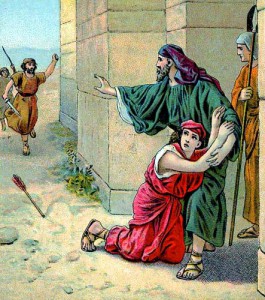Joshua 20 (Cities of Refuge)
And welcome back to the Internet’s greatest Bible commentary, in which Yours Truly reads through the Bible and explains its many mysteries as best my limited education allows. I encourage you to read the Good Book along with me, because my time’s too valuable to write summaries. Here we go!
Wow. That last post really pulled us ahead, didn't it? Only four more chapters to go now. You hardcore bloggers out there will think I'm a wimp for saying it, but I'm glad; publishing a daily series has been fun but tiring. I want to continue on to the Book of Judges, but I think I'll be taking a break before I do.
Onto Chapter 20.
20:2. "Speak to the children of Israel, saying, 'Prepare for you cities of refuge, of which I spoke to you through Moses.
This order was given by the LORD way, way back in Numbers/Bamidbar 35.
20:6. And he shall dwell in that city until he stand before the tribunal for judgment, until the death of the High Priest that shall be in those days. Then shall the slayer return, and come to his own city, and to his own house, to the city from which he fled."
I was confused when I first read this verse and had to seek clarification, so I'll now offer the same. A man who accidentally kills another may legally take refuge in one of six designated cities, after which he is marched back to his own town under guard in order to stand trial. If he is found guilty of intentional murder, he is executed; if not, he is returned to the city of refuge, wherein he must remain until the death of the high priest living there, an event which atones for an exile's sin.
Three cities are selected for the purpose on the western side of the Jordan River and three are selected to the east of it. Each of the three to the west - Shechem, Hebron, and Kadesh - were major centers of religion and naturally belonged to the Levites, so we can safely assume that the other three - Bezer, Ramoth, and Golan - were as well.
Their ability to protect people comes from the ancient and especially Hebrew idea of "holy ground", derived from a god's ownership of it and presence on it. Such land is naturally not beholden to any temporal authority, so its caretakers are in theory free to defy any secular parties' demands of it, such as extradition of a fugitive. This idea is basically still a part of the Catholic Church's doctrine and until the seventeenth century, it still had the clout to make its churches sanctuaries from local law.
(I should note in fairness that the Catholic Church itself argues its concept of sanctuary has nothing to do with ancient cities of refuge. Quoth the Catholic Encyclopedia: "The right of sanctuary was based on the inviolability attached to things sacred, and not, as some have held, on the example set by the Hebrew cities of refuge." Since the power of the cities rested on the inviolability of sacred things, however, I think the two concepts are justly identified with each other.)
Historically, the Hebrew cities of refuge may have not actually worked out so well in practice as they were supposed to in theory. Apparently they didn't in other civilizations of the time. Wikipedia's entry on the subject says:
Over time, these general rights of asylum were gradually curtailed, as some sanctuaries had become notorious hotbeds of crime; in Athens, for example, the regulations were changed so that slaves were only permitted to escape to the sanctuary of the temple of Theseus.
Some historians suggest this is why only six cities are listed when in theory any Levite city should work. By the time the Book of Joshua was written, other cities had eliminated the policy.
Later there was also the problem of what to do when not all six of the cities in question were under Jewish authority. Rabbis pragmatically concluded that alternative cities could be designated as necessary. Other Hebrew traditions and bylaws concerning issues with the cities of refuge are just as entertainingly practical. The Mishnah tells us that the mothers of the high priests were understandably concerned that the refugees would wish a quick death upon her son and that their thoughts would cause exactly that (an "evil eye" -type superstition), so they traditionally offered gifts of food and clothing to the new arrivals.
It was my intention to cover two chapters in today's post, but after reading Chapter 21 I've realized that doing it justice is going to require its own day's work.
NEXT: The secret identity of the Levites!
Bible Translation: Judaica Press's Tanach with Rashi commentary, courtesy of Chabad.org.
Picture: Cities of refuge, as in Joshua 20:1-9, illustration from a Bible card published 1901 by the Providence Lithograph Company.
OTHER POSTS IN THIS SERIES:
This entry was tagged. Bible Commentary Joshua
